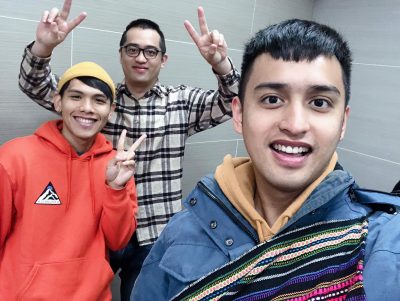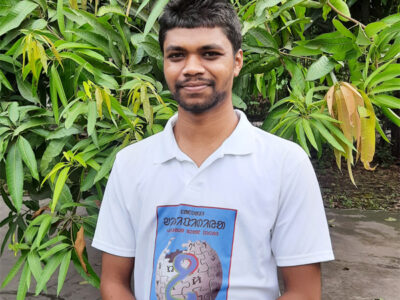Q&A: Meet Bali Subalian, Bunun language activist

Bali Subalian (left) and his co-hosts Yawi (middle) and Yuway (right). Photo provided by Bali Subalian.
Following last year's successful social media campaign celebrating linguistic diversity online throughout Asia, the collaborative project is continuing in 2020. Every week, a different language activist and advocate will be taking turns managing the @AsiaLangsOnline Twitter account to share their experiences, best practices, and lessons learned from their revitalization work promoting the use of their native languages, with a special focus on the role of the internet. This campaign is a collaboration between Rising Voices, the Digital Empowerment Foundation, and the O Foundation.
Each week, the upcoming host will answer several questions about their background and give a brief overview of their language. This Q&A is with Bali Subalian / Ching Hao Chen (@balisubalian) who will provide a sneak preview of what he will be discussing during his week as host.
Rising Voices (RV): Please tell us about yourself.
Bali Subalian (BS): I’m Bali and also a member of the Bunun community, an indigenous people in Taiwan. I am a graduate student in ethnology, using a linguistic anthropology approach to research semantic change in the Bunun language. Besides me, the two co-hosts, Yawi and Yubay, have been sharing thoughts on indigenous language through different means, especially on social media like Facebook and Instagram. In recent months, since the outbreak of the pandemic, the three of us have been designing an abundance of digital materials about COVID-19.
RV: What is the current status of your language on the internet and offline?
BS: Growing up in a Mandarin-speaking society as indigenous people, we are seen more as good students than as members of each community. In addition, the elders of our family are able to frequently speak our language, but unfortunately we are exceptions. However, we still enjoy sharing our ideas and feelings about our daily lives and different issues in our language. Luckily, the elders are excellent language teachers and willing to offer us a great deal of assistance, which has fostered our proficiency in the language.
RV: What topics do you plan to focus on during the week that you’ll manage the @AsiaLangsOnline Twitter account?
BS: In managing the @AsiaLangsOnline account, we will cover four topics: the introduction of our two languages (Bunun and Ayatal), digital materials about the pandemic and contemporary vocabulary, challenges faced by our languages, and finally thoughts about the one-year anniversary of same-sex marriage in Taiwan. We will write in Bunun and Atayal on alternate days, alongside English.
RV: What are the main motivations for your digital activism for your language? What are your hopes and dreams for your language?
BS: Our motivation in doing this is quite simple : we crave representation for our two languages. Also, we are just eager to speak our languages and fortunately, we have learned a lot in our communities, which pushes us to be active in recording and collecting all of the information in the cloud.
Support our work
Since Rising Voices launched in 2007, we’ve supported nearly 100 underrepresented communities through training, mentoring, microgrants and connections with peer networks. Our support has helped these groups develop bottom-up approaches to using technology and the internet to meet their needs and enhance their lives.
Please consider making a donation to help us continue this work.



